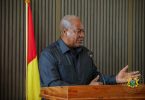The International Monetary Fund (IMF) has issued a cautionary statement to the Bank of Ghana, underscoring the critical importance of adhering to its policy mandates despite facing a financial setback in the fiscal year concluding in 2022. The IMF’s warning comes as the Bank of Ghana encountered challenges that led to a substantial loss, impacting its net equity significantly.
Amidst these difficulties, the IMF stressed the necessity for the central bank to take resolute actions to reestablish inflation at its designated target of 8 percent. In an official release on Thursday, the IMF articulated, “The loss the BoG incurred in the process has contributed to reducing its net equity to a negative value. Importantly, however, this does not prevent the BoG from fulfilling its policy mandates and ensuring inflation gradually returns towards its 8-percent target.”
The financial setback faced by the Bank of Ghana is largely attributed to its participation in the government’s Domestic Debt Exchange (DDE), which was carried out with the intention of restoring macroeconomic stability and public sustainability. The IMF supported the Bank of Ghana’s GHS 60 billion loss, viewing it as a necessary measure in light of the broader economic goals. The central bank’s involvement in the DDE aimed to distribute the burden that the DDE imposed on various stakeholders, including government debt holders, financial institutions, pension funds, and individuals.
The IMF also expressed its expectation that the central bank’s income would prove sufficient to cover the expenses linked with monetary policy. Moreover, the IMF anticipates a significant improvement in the BoG’s net equity over time, eventually leading to a return to positive territory.
The financial challenges faced by the Bank of Ghana stemmed from the government’s Domestic Exchange Programme (DDEP), which subjected the central bank’s non-marketable holdings of government instruments to a 50 percent reduction in value. Furthermore, the Bank of Ghana’s claims on marketable instruments were exchanged under comparable terms as those of other financial institutions participating in the DDEP, resulting in the impairment.
Additionally, the Bank of Ghana recorded revaluation losses on its foreign assets and liabilities, primarily due to exchange rate depreciation. Consequently, the central bank reported a total equity loss of GH¢55.12 billion in the year 2022.
While the Bank of Ghana maintained that its decision to participate in the DDE was crucial to safeguarding the economy, industry players have expressed concerns about the bank’s rationale and its potential implications. Critics have accused the Bank of Ghana of fiscal irresponsibility and questionable practices, claims that the bank vehemently refuted. Some financial analysts have questioned the central bank’s repeated attribution of its losses to the domestic debt exchange, suggesting that a more thorough examination is needed.
Despite these concerns, the Bank of Ghana remains steadfast in asserting its financial soundness. It underscores that its non-commercial nature shields its operational capabilities from the impact of its financial results. However, some industry insiders argue that this stance is untenable and calls for a more comprehensive evaluation of the bank’s financial decisions and their consequences. The ongoing discourse between the Bank of Ghana and its critics underscores the complexities and challenges associated with central bank policies in a rapidly evolving economic landscape.







